Peter MALONE
Saturday, 18 September 2021 19:57
Tales of Hoffmann, The
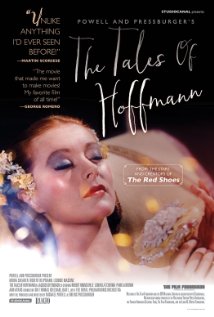
THE TALES OF HOFFMAN
UK, 1951, 128 minutes, Colour.
Robert Rounseville, Moira Shearer, Ludmilla Tcherina, Ann Ayars, Pamela Brown, Leonide Massine, Robert Helpmann, Frederick Ashton, Mogens Wieth.
Directed by Michael Powell, and Emeric Pressburger.
Michael Powell had established himself as a significant British director in the 1930s. In working with Emeric Pressburger, the couple calling themselves The Archers, they produced a body of work during the 1940s which is quite outstanding, war efforts like One of Our Aircraft is Missing, the satiric The Life and Death of the Colonel Blimp, local dramas like The Canterbury Tales and I Know Where I am Going. In 1947, they made the striking drama of Anglican nuns in India (all filmed in British studios), Black Narcissus. They followed with the classic ballet film, The Red Shoes, with Moira Shearer and Robert Helpmann.
After some dramas and melodramas, they attempted the very ambitious The Tales of Hoffman, based on Offenbach’s music, in 1951. They brought their visual talent to bear with the staging of the ballet and opera sequences, the costumes and decor, on-screen in vivid colour. The film is quite stagebound, opening in an inn in Nuremburg with Hoffman beginning his tales, sung and danced by American Robert Rounseville. Robert Helpmann has four different roles, some sinister, some dramatic, a tour de force from the Australian actor, choreographer and ballet dancer. Ballerinas like Moira Shearer and Ludmilla Tcherina play different roles offering a variety of dancing styles. On the male side, Leonid Massine also has a number of roles in quite different dancing styles. Frederick Ashton, who choreographed the film, also appears in several dancing roles. Opera singer, Ann Ayars has an operatic tale of her own.
The film was severely cut for release and it is only in the 21st century that the full film has been painstakingly restored, urged on by Martin Scorsese who, in an interview, explains it was one of the films that had a great influence on him when he was young.
Audiences who do not respond immediately to opera and ballet might find the experience somewhat trying – but will be in admiration of the cinematic, musical and dancing skills that have been brought to this film, remembering also that it was made in the early 1950s.
1. The work of the Archers, during the 1940s, into the 1950s? The lavish style, melodrama, use of colour, music? Delight in music and ballet?
2. 1951, the work of Offenbach, the cast, singing and dancing, professionals, the use of actors? The screenplay, the translation?
3. The credits, the explanation? The ending?
4. The staging, the photography, the musical score? Sets and costumes? The touch of the exotic?
5. Special effects, the transitions between scenes, the performers and the taking different roles in different stories? Pamela Brown as Niklaus?
6. The introduction, Hoffman, Nuremberg, the Tavern, his stories? The hero, his tales, loves, sadness, women, the roles of Robert Helpmann as an antagonist?
7. Robert Helpman, sinister influences, relationships, jealousy, the note, the glasses? As Lindorf, Coppelius, Dapertutto, Dr Miracle?
8. The dancing of Leonide Massine, the different characters, his range of dance?
9. The ballerinas, Moira Shearer, Ludmilla Tcherina? The characters, the range?
10. Robert Rounseville and his singing, performance?
11. Frederick Ashton, his choreography, his characters?
12. Ballet, choreography, staging? Opera and voices? Songs and emotions?
13. The popularity of Offenbach’s Bacarolle, the exotic settings?
14. The style of dancing, classic, of its period, later?
15. The ending and the presentation of performers and characters?
16. An exotic musical, ballet and opera experience?
Published in Movie Reviews
Published in
Movie Reviews
Tagged under
Saturday, 18 September 2021 19:57
Grumpier Old Men
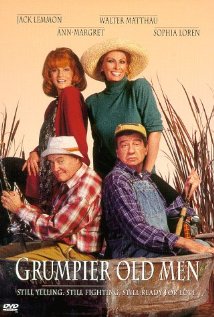
GRUMPIER OLD MEN
US, 1995, 101 minutes, Colour.
Water Matthau, Jack Lemmon, Ann- Margaret, Sopha Loren, Burgess Meredith, Daryl Hannah, Kevin Pollak.
Directed by Howard Deutch.
Grumpy Old Men was so popular in 1993 that it was quickly decided to make a sequel. But, the old men were friendly at the end of the first film so a lot of grumpiness had to be contrived for this one. And, Jack Lemmon had won the competition for Ann -Margret, so the question remaining for Walter Matthau was the issue of romance!
John, Jack Lemmon is happily ensconced with his new wife, Ariel. And he is somewhat reconciled with his crusty neighbour, Max, Walter Matthau. One of the concerns uniting them is the prospective marriage of John’s daughter and Max’s son, Daryl Hannah and Kevin Pollak. Just when everything seemed obvious, Daryl Hannah has hesitations and Kevin Pollak is upset, causing a rift, and there is a postponement of the wedding, bringing about some more grumpiness between the two men.
As regards romance, here is Sophia Loren, aged 60 and more glamorous than ever, playing Maria, married five times, taking refuge in Minnesota with her mother, turning the bait shop into a restaurant – and incurring the wrath of the two old men who put themselves out to dire sabotage efforts. However, there is a seemingly unlike attraction between Max and Maria, and some romance, and falling out, and reconciliation.
Burgess Meredith is there, in his final film, as John’s father, sadly dying by his beloved lake.
There is a good joke at the end, when the two men dress up for the wedding, which audiences presume is that between son and daughter, and while two are driving to the church, they meet an old man who has seen the fish that they have been searching for for decades. They decide to go to find the fish, catch it, put it back in the water and hurry to the wedding – which turns out to be, actually, that between Maria and Max!
Amusing, and one more contribution of the teaming Jack Lemmon and Walter Matthau from Odd Couple days onwards.
1. The popularity of Grumpy Old Men, the teaming Jack Lemmon and Walter Matthau? Their past films, interactions, repartee, pranks and insults? Entertaining comedians?
2. The touch of glamour with Ann- Margret as well as Sophia Loren?
3. A popular sequel, continuing the characters in themes of the first film? Friendship – falling out, further grumpiness?
4. The Minnesota settings, the seasons, the snow, the fishing, the bait shop, the restaurant? Marriage preparations, celebrations, the church?
5. The musical score, the range of songs, Max and Staying Alive, the Gershwin songs?
6. John, his marriage to Ariel, their happy life together, the character, at home with John, Ariel exasperated with his pettiness and fighting, walking out – and the scene with the dog rampaging through the house and her dropping the nude statue of John (after the video being exposed in the shop)? The happy reconciliation? The preparation of the wedding? John and the bond with Max, Maria’s arriving, her plans for the restaurant, the two men visiting, the sabotage, the criticisms of Maria and the restaurant? Jacob and Melanie, the preparation for the marriage, the location for the reception, payments, the celebration in the crowd, the musicians and the comments, Melanie upset, Jacob’s reaction, the two fathers trying to remedy the situation? Halloween, the costume?
7. Max, the past experience with Ariel? Maria’s arriving, the reaction to Chuck’s bait shop, the visits, the sabotage, the clash in the supermarket? Yet the attraction?
8. John’s father, old, fishing, the lascivious comments, the encounter with Maria’s mother, the sexual attraction, the innuendo (as well as during the final credits)? The pathos of his death? Funeral? Ashes in the river?
9. Maria, in herself, the five marriages, her mother’s criticisms, the planning for the restaurant, the transformation, the clash with John and with Max? Yet the attraction to Max? His visit to the restaurant, change of heart, her mother and the baseball bat, letting him in? The searching for the worms? The invitation to the meal, his burning the food, making sandwiches, her not turning up, her mother’s questioning, the thinking, Max and his asking for an explanation, Maria giving it, going for the sandwiches?
10. Jacob and Melanie, the daughter, love, the clash, not talking, the exasperation of the fathers? Halloween, Jacob and the costume, apologies, the reconciliation?
11. The wedding sequence, Ariel preparing, audiences assuming that Jacob and Melanie would be wed? The two fathers, getting dressed , the old man on the road, the giant fish and their continued quest, their going to the lake, fishing, delaying the wedding, landing fish, the decision to put it back in the water? The race to the wedding, reckless driving, arriving, the organist playing the music over and over again?
12. The irony that it was Max’s wedding to Maria, Melanie as the maid of honour, the ceremony, everybody happy?
Published in Movie Reviews
Published in
Movie Reviews
Tagged under
Saturday, 18 September 2021 19:57
Iron Will
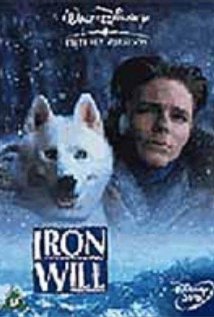
IRON WILL
US, 1994, 108 minutes, Colour.
Mackenzie Astin, Kevin Spacey, David Ogden Stiers, August Schellenberg, Brian Cox, George Gerdes, John Terry, Penelope Winddust.
Directed by Charles Haid.
Iron Will it is one of the life-action Disney features of the 1990s. It is a star vehicle for Mackenzie Astin, son of Patty Duke and John Aston, who acquits himself well, a 17-year-old who joins in a sled and dogs race from Winnipeg to St Paul for money to save his mother’s farm after the death of his father.
There is a great deal of attractive location scenery through the snow and mountains of Canada and in Minnesota. And there are action scenes with the dogs racing through the forests, the hardships, the dangers from competitors, the weariness, the courage of the dogs, crossing railway lines. The setting is 1917, with the debate about the US entry into World War I, a great deal of patriotism and flag-waving, with the young man becomiing a hero.
Kevin Spacey, just before his Oscar for The Usual Suspects, is a mercenary newspaper reporter on the entry of the young man into the race. David Ogden Stiers is the organiser. Brian Cox is his friend and rival, adding something sinister to the proceedings.
The film was directed by actor-turned and director, Charles Haid.
1. An entertaining and inspiring family film? From Disney?
2. Based on fact, 1917, the background of World War I, America’s entry, the patriotism, the songs against the Kaiser, enlistments? The race and its propaganda value? American response? Newspapers and headlines? Flag-waving?
3. The location photography, Canada and the United States? Winnipeg? The race trail through the forests and snow? St Paul? The musical score?
4. The action sequences, the sleds, the dogs, the forests, snow, crags, rivers, railway lines? Stunt work?
5. The focus on Will, young man, his parents hopes for him to go to college, his wanting to support his family, love for his father, his father and the dogs,
Gus, the whistle and the melody? His father’s death and its effect? The burden on his mother? The friendship with Ned Dodd, his support?
6. The race, the atmosphere, Will and his decision to enter? With the dogs? The antagonism towards Gus, Gus and the savage attack? Yet Will taking him with the other dogs for the race? The attack on the dogs, Gus being wounded, Will and paste and healing?
7. Arriving late for the entry, the antagonism, the authorities not wanting him to enter, Kingsley and his supplying the money for the entry? The challenge to the organiser for his patriotism and reputation? The other members of the race, Borgen from Scandinavia, his vicious criticisms? His further antagonism during the race, being bribed by Mc Teague, setting the wolf on the dogs, Will and his confrontation, Borgen backing down?
8. Kingsley, his press colleagues, on the train, Kingsley and his cynicism, his hopes for promotion, articles? His writing, supporting Will? Not getting the headlines? The response to Will’s saving the injured man? Front-page? Hero, the results? Lambert and the others and their criticising Kingsley for not having a heart? Will punching Kingsley? Kingsley and the final encounter with Will, waking him after two hours, helping him, changing his attitude? Ensuring that his mother and Ned Dodd were at the finishing line?
9. Will, his character, age, determination? His skills, surviving, with the dogs, the hardships, not lighting fires, eating the fruit cake, little sleep? Rescuing the man and bringing him to the train? Mc Teague and his bribe, Will not accepting? The need for sleep, continuing on, on the railway line and the dangers, the dangers for the young boys, needing the blacksmith to mend the sled, the final race to the finish, the shortcut, the desperate finale, touching the line first?
10. The organisers, Harper, the critique, the different attitudes, the bets? Mc Teague being mercenary, wanting his money, bribing Borgen? Will saving his man, his offering the $3000? Harper and his integrity, supporting Will, winning out in the end?
11. The role of the press at the time, reports, articles? The race, judges using telescopes?
12. In Will’s town, the hostility of his boss, Will and his job, the crash, arriving late? The pompous attitude, thinking that they were bringing Will’s remains?
13. Emotion at the end, the audience willing Will to succeed?
Published in Movie Reviews
Published in
Movie Reviews
Tagged under
Saturday, 18 September 2021 19:57
Misery Loves Comedy
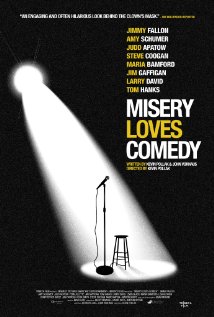
MISERY LOVES COMEDY
US, 2014, 90 minutes, Colour.
Amy Schumer, Janeane Garofalo, Bobby Canavale, Judd Apatow, Matthew Perry, Jon Favreau, Sam Rockwell, David Wain, Kevin Smith, Freddy Prinze Jr, Jermaine Clement, Jimmy Fallon, Mike Birbiglia, Stephen Merchant, Jason Alexander, Lewis Black, Whoopi Goldberg, Jim Gaffigan, Christopher Guest, Nick Swardson, Martin Short, Larry David, Kevin Pollak, David Koechner, Jason Reitman, Kumail Nanjiani, Jim Norton, Richard Lewis, Jim Jefferies, James L.Brooks, Wayne Federman, Kathleen Madigan, Kelly Carlin- Mc Call.
Directed by Kevin Pollak.
This is a documentary featuring more than 50 comedians. They have been interviewed by actor-director, Kevin Pollak, specifically for this film or as part of the chats on the Kevin Pollak Chatshow.
The film is mainly talking heads, but with some photos, some glimpses of performance, but mainly relying on the personalities of the comedians, there are particular presentation of themselves, articulate responses to the questions asked. Commentators have noted that Eddie Murphy is absent, as are Louis C.K and Chris Rock.
This is the range of questions:
- issues of the influence of Mommy and Daddy
- the 'look at me disease '
- oh, I see how this works
- ain't no drug like the high wire
- one of the wonderful things
- the Brit who stole from Spinal Tap and other influences
- birds of a feather
The cumulative effect is that audiences will have quite some understanding of the psyches of the comedians, their motivations, their skills, their experiences, frustrations, influences, their translating all of this into stand-up, jokes and communicating with audiences.
Published in Movie Reviews
Published in
Movie Reviews
Tagged under
Saturday, 18 September 2021 19:57
Gift, The/ 2015
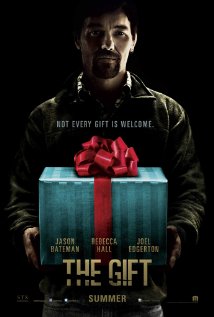
THE GIFT
US, 2015, 108 minutes, Colour.
Jason Bateman, Rebecca Hall, Joel Edgerton.
Directed by Joel Edgerton.
This is one of those stories that it is best to know very little about before seeing the film, wondering, as the film starts, where it could be going, and becoming more suspicious, more questioning, as the film proceeds.
The film was actually written and directed by Australian Joel Edgerton, who has written a number of screenplays, including Felony, and who has been very successful in his screen career both at home in Australia and internationally. The screenplay is very well written, relying on some of the tried and true conventions of this kind of drama as well as some surprises, establishing characters, and gradual revelation of depths in characters and bringing it to a surprisingly edge in the ending.
It all seems very familiar at the opening, an affluent young couple moving to Los Angeles, buying an attractive home in the hills, settling in, she with some business work at home, he a successful salesman with prospects of promotion. So far, so expected. Except that the salesman, Simon, is played by Jason Bateman, best-known for his comedies, his succession of put-upon characters, with characteristic deadpan response, in films like Identity Theft, the Horrible Bosses series… But, it must be said, he plays this very serious role with great skill, an ability to seem ordinary, and ability to mask what is really going on, yet gradually revealing that there is quite a different character underneath his surface.
His wife, Robyn, is played by Rebecca Hall, a versatile actress in such films as Vicky Cristina Barcelona, The Town. She plays her role with great charm, loyal to her husband, yet very sympathetic to the stranger who accosts them as they are at a cash register in a shop. The stranger, Gordo, is played by Edgerton himself, who reveals himself as having been in the same class at school with Simon.
It is Gordo who first leaves a gift at the door, with a card in a red envelope, as a welcome to the couple. Later, he turns up with some more gifts and happily accepts an invitation to stay for a meal, Simon revealing that he remembers Gordo (“Weirdo Gordo”) and would rather have nothing to do with him. Robyn can’t quite understand this.
As Robyn tries to understand better, while sympathetic to Gordo, step by step she uncovers a story that she had not been expecting, traits in her husband that she may have suspected but would have repressed. And, while she is in hospital for the delivery of her baby, Gordo sends three gifts to Simon, reminding him that bygones sometimes cannot be left as bygones.
This means that the film ends with the audience as well as the characters on edge, with quite some unpleasant feelings, unsettling, giving audiences something to reflect on. (Some advertising and comments might lead audiences to expect a somewhat demonic and shock thriller in the vein of the Ingenious series but it is better to think of it more straightforwardly as a domestic drama, delving into the past and experiencing consequences.)
1. Suburban drama? Thriller?
2. The Los Angeles settings, fashionable homes, workplaces, hospital? The musical score?
3. The title, the initial gift, the increasing number of gifts, the red envelope, the notes, the smiley or glum, suspicions – and the final three gifts for Simon?
4. Contemporary couple, affluent, work and promotions, social life, homes, building a family, threats?
5. The past, the consequences? Telling lies, bullying, making others complicit? Violent consequences? Damaging the psyches of victims? Slurs, violence? The issue of bygones and letting them be? Revenge?
6. Simon and Robyn, buying the new house, the spiel of the agent, liking it, moving in, settling? Simon and his new job, the bosses, workers? His feeling at home? Going to the shop, the purchase? Gordo introducing himself, Simon saying he did not recognise him, the response, chatter, school, catching up? The phone number?
7. The gift at the door, Gordo leaving it, the note? His bringing gifts, the fish? The phone calls? Robyn and liking him, inviting him in, cooking the meal, the discussion at the meal, Gordo drinking, talking of the past, Simon’s reaction, negative? Robyn’s defence of him?
8. The promotion, the bosses, the neighbours, celebrating, parties? The discussion of Simon’s rival, his getting the file, the slanderous emails, the rival losing the job, his arrival at the house, smashing the window, his anger, being taken away?
9. Robyn, liking Gordo, the puzzle, the dinner at the house, his leaving, the mystery? His dinner at their house? The talk? Going to the neighbours house and discovering the owners away and Gordo using it? ‘s explanations?
10. The note, letting bygones be got bygones? Robyn and her puzzle?
11. Gordo, the story, at school, his being bullied? The repercussions, his father’s behaviour, condemnation, homophobia?
12. Robyn, Simon’s talk about his schoolfriend, their interactions with Gordo, her going to see him, finding out the truth of the story, the bullying, Simon and his brutality, Gordo’s reputation and the consequences?
13. Simon, Simon Says… The revelation of Simon as a bully, instigating the persecution, following it up?
14. Robyn, the confrontation with Simon, his hard response? Unrepentant? His documentation, Robyn searching, the file about his rival and the consequences in the rival’s attack on the house?
15. Gordo and his leaving of the several gifts, Robyn, in the hospital, giving birth? Simon and his look for the baby, Robyn? The three gifts, the messages, Simon unpacking them, the recordings, the images, Gordo and the previous fixing of the appliances in the house, setting up the surveillance, the truth of Simon’s talk about him and his playing it?
16. Gordo, sinister, the bygones, the images of Robyn’s collapse, the suggestions of rape, the conception of the child? Simon’s not being sure?
17. A domestic drama, the bullying implications, the hurts of the past, consequences, revenge? The future of each of the characters?
Published in Movie Reviews
Published in
Movie Reviews
Tagged under
Saturday, 18 September 2021 19:57
Love Marilyn
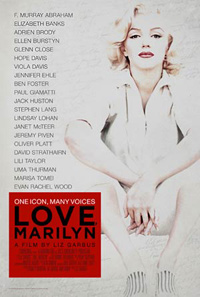
LOVE, MARILYN
US, 2012, 107 minutes, Colour.
Lauren Bacall, F.Murray Abraham, Elizabeth Banks, Adrien Brody, Glenn Close, Ellen Burstyn, Hope Davis, Viola Davis, Jennifer Ehle, Ben Foster, Jack Huston, Stephen Lang, Lindsay Lohan, Janet Mc Teer, Jeremy Piven, Oliver Platt, David Strathairn, Lili Taylor, Uma thurman, Evan Rachel Wood, Donald Spoto, Molly Haskel, Paul Giamatti.
Directed by Liz Garbus.
Love, Marilyn is quite an extensive documentary about the screen goddess of the 1950s. It has to be said that it is a warts and all portrait as well as highlighting the star’s talent, her glamour, her films as well as her private life.
The particular device of the film is to have well-known Hollywood stars actually speak Marilyn Monroe’s lines, which gives force, dramatic impact, but it is sometimes hard not to respond to the particular stars speaking the lines and their screen presence and audience memories. However, there is a wide range with some making more impact than others.
The film has a great deal of archival footage of people in Marilyn Monroe’s life, from agents and mentors, to husbands Joe DiMaggio? and Arthur Miller, to the Strasbergs, and the many performers she acted with. There is quite a lot of interview footage which fills in the historical background of her childhood, of her early emergence as an actress, the notorious photography, the small parts, the build-up to her stardom and glamour, the important years of the mid 50s, the difficulties with Laurence Olivier, as well as her personal life, the marriages, her attempts at something intellectual, her dependence on pills…
This is an opportunity to learn something about Marilyn Monroe as well is to see many clips from her films and appreciate her talent and impact.
1. Audience interest in Marilyn Monroe? After 50 years? As an icon, sex symbol? Death at 36?
2. The screenplay based on personal documents, newly discovered, Marilyn Monroe’s poems, notes? And the material in the public domain?
3. The insertion of clips of films? The revelation of Monroe as a screen presence, as an actress, comedienne? Her ambitions to be a serious actress? The studies, reading, training, the Actors Studio?
4. The use of actual footage about Marilyn Monroe, interviews, career, with Joe Di Maggio, with Arthur Miller? With Paula Strasberg?
5. The device of having actual actors appear on screen, speaking Marilyn’s lines, speaking the lines of characters she interacted with? How much of a distraction because of the screen presence of the actors? Their skill in embodying Marilyn’s spirit? Performance, interpretation? The range of the cast? Indications throughout the film?
6. The interviews with friends of Marilyn, their first-hand knowledge of her, friendship with her, criticisms of her? Other characters as themselves?
7. Marilyn Monroe, her origins, her mother, fostered, the family, the effect?
8. California, hopes, her contacts? Ambitions?
9. Her being somewhat plain, growing up and her gradual beauty, the photography, her notoriety?
10. Agents, relating to them, their work for her?
11. Issues of sexuality, relationships, the background of the casting couch?
12. Her new name, transformed, becoming Marilyn Monroe instead of Norma Jean Baker?
13. Her early films, the bit parts, the glimpses, e.g. Love Happy with Groucho Marx?
14. The successful breaks, her appearing in Niagara? The clip? The promotion at the time? The development of her career? Gentlemen Prefer Blondes?
15. The relationship with Joe Di Maggio, the clips about their meeting, the marriage, her motivation, his reasons for marrying, the effect, her admiration for
him, the filming of the key scene of The Seven Year Itch and his puritanical attitudes?
16. Arthur Miller, his character, reputation, his interest in Marilyn, highbrow, her hopes, the marriage, the relationship, her improving her mind, love, difficulties?
17. Her appearance in Bus Stop, a step towards serious acting? The episode of the Sleeping Prince, the Prince and the Showgirl? The interactions with Laurence Olivier and the difficulties? With Billy Wilder and working for Some Like it Hot?
18. Her decline, the difficulties with Arthur Miller, is writing, The Misfits, her performance, Somethings Gotta Give, her being fired, the shock?
19. The background of Actors studio, Paula Strasberg, Susan strakes Strasberg as a friend?
20. The issues of medication throughout her life, motivations, dependency? Her death? The verdict? In the aftermath of singing for President Kennedy?
21. A recapitulation of the career of a significant 20th-century icon, the tragedies of her life and death?
Published in Movie Reviews
Published in
Movie Reviews
Tagged under
Saturday, 18 September 2021 19:57
Sonner/ Sons
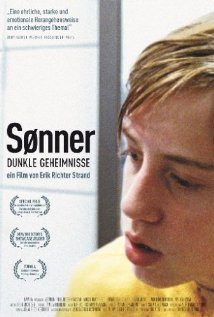
SONNER/SONS
Norway, 2006, 103 minutes, Colour.
Nils Jørgen Kaalstad, Mikkel Bratt Silset, Edward Schultheiss
Directed by Erik Richter Strand.
Sons is a strong film about male predators of young boys. It is set in a Norwegian town, opening in a public baths where one of the lifeguards is suspicious of a man prowling and swimming with the youngsters. It emerges that he had been molested by this man when he was young. And it later emerges that his fellow lifeguard had been molested.
Lars, the lifeguard, gets a camera and photographs the predator in action, going to another victim who now works for a television station, asking him to play the material but to blur the face of the victim. Lars had previously encountered the victim after a group prank, boys peering into the shower room for the women at the baths. The boy, Tim, had knocked over a woman who was bitter about her injury, with Lars urging Tom to apologize and being able to continue to come to the baths.
There is also his fellow-lifeguards girlfriend who is pregnant, and who is the boss, and she fries him. With his own girlfriend as confidante, he decides to pursue the predators and expose them. Once again he encounters Tim and rescues him, even though Tim says he does not want to be rescued.
This is a strong theme of the film, the willingness or unwillingness of the boys to go along with the predator, often seeing him as someone interested in them more than their family, as a father-figure. However, the predator is given lines which attempt to justify his behaviour, that this happens in all societies, the society takes it for granted, that the boys are willing collaborators. The predator has photos of all his victims on his computer bringing Lars to memories of his past, for his friend who finally admits his being abused and this instigates his outburst of anger on the predator.
The media also invents a group of vigilantes, the anti-Pedo Action Group. This actually excites Lars as he goes on his crusade, the drama being brought to a head when he has to rescue Tim from the predator and a gun is drawn.
The ending is open, audiences wondering what will happen to the predator, what Lars will actually do, what will happen to Tim.
Published in Movie Reviews
Published in
Movie Reviews
Tagged under
Saturday, 18 September 2021 19:57
Early One Morning/ De Bon Matin

EARLY ONE MORNING/DE BON MATIN
France, 2011, 91 minutes, Colour.
Jean- Pierre Darroussin, Valerie Dreville, Xavier Beauvois.
Directed by Jean- Marc Moutout.
Early One Morning a striking French drama, focusing on a seemingly ordinary man, aged 50, going to work one morning and then drawing a gun and shooting his associates. He locks himself in his office and contemplates his life, the flashbacks tracing the arc of his life, unhappiness and relationships, at work, in himself.
The strength of the film is in performance of its style, the always visit an interesting Jean- Pierre Darroussin. Of interest, in the role of Alain Fisher is the director of Of Gods and Man, Xavier Beauvois.
1. A contemporary drama? Male crisis? Mid-life crisis and career? French setting? Universal experience?
2. The setting of the global financial crisis? Personal crises, the bank crises? Managers, deals, clients, employees? The feasibility of bad management? Salaries, bonus, promotions?
3. The French setting, the characters? The French slant on the issues?
4. Paul, his age, the opening with his getting up, his relationship with his wife, going to work, public transport, ordinary? Greeting people in the office? Shooting the managers? Going to his desk and sitting?
5. The flashbacks and the portrait of Paul, his character, the upright man, dedication to his work, love for his wife, becoming more desperate, the strained relationship with his son, studies, the son’s reaction to his father? At work, colleagues, discussions, meetings with clients, writing reports?
6. The company bringing in the head kicker, the discussions with Paul, the report and the firing of the female co-worker, her attitude? Paul wanting to talk with her, explanations, her turning on him? Having the documents? Wanting to remove the blame? The various moves in the office, the critique?
7. The psychological pressure, the past and his hopes, becoming more desperate, discussion with his friends and the office? The discussion with the young assistant brought in to improve matters, confiding in him, helping him, his siding with the bosses, becoming a victim of the shooting as well?
8. The consequences for Paul, his shooting himself? Audience response? The family and the aftermath?
9. An effective brief drama about important work, social, psychological issues?
Published in Movie Reviews
Published in
Movie Reviews
Tagged under
Saturday, 18 September 2021 19:57
Grumpy Old Men
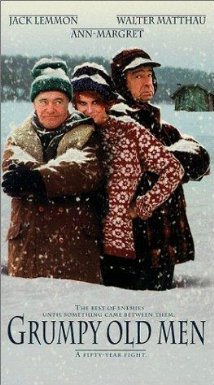
GRUMPY OLD MEN
US, 1993, 103 minutes, Colour.
Jack Lemmon, Walter Matthau, Ann- Margret, Burgess Meredith, Ossie Davis, Daryl Hannah, Buck Henry, Kevin Pollak, Christopher Mac Donald.
Directed by Donald Petrie.
In 1968, Jack Lemmon and Walter Matthau made a great impression in the screen version of Neil Simon’s The Odd Couple. The interactions, the repartee, the contrast between the obsessive Felix and the slob, Oscar, made for good comedy. The actors appeared in a number of films together, especially for Billy Wilder, over the ensuing years.
They were together in the 90s for this film and its sequel, Grumpier Old Man, as well as and the comedy, Out to Sea.
The film has an interesting cast with Ann- Margret as the glamorous love interest, with Burgess Meredith as Jack Lemmon’s old father, crusty and lascivious, Ossie Davis as the owner of the bait shop, Kevin Pollak as Matthau’s son and Daryl Hannah as Lemmon’s daughter, and a comic turn from Buck Henry as the tax inspector.
The film has a lot interchanges between the two grumpy men, the pranks they play on each other, the romantic interest in Ann- Margret, the rivalry, her final choice.
1. The popularity of Jack Lemmon and Walter Matthau, and on-screen couple for so many years? In their final years? The comic styles, skills?
2. The title, the emphasis on the grumpiness, antagonists since childhood, the photos and stories of the past, the memories? Into adulthood? Into old age? The becoming parents, grandparents?
3. The Minnesota settings, the north of the US, the seasons, the weather, homes, the ice fishing, the markets, the bait shop, the life of the town…? The musical score?
4. John’s story, as a child, marriage, marrying Walter’s flame, the unhappiness in the marriage, the daughter, his living alone, fishing, the insults and pranks with Max, his daughter, his granddaughter, the visit, the separation, the later visit of the husband, and John’s not liking him? The discussions with Jacob? His hopes with his daughter and Jacob? The bait shop, Chuck? Chuck’s death after the evening with Ariel?
5. Max’s story, childhood, his girlfriend, John marrying, his wife, the happy marriage, Jacob as his son, the pranks, the controlling switching John’s television channels, the criticisms, the ice fishing, the fish in the car and the stink, stealing the fish, breaking the reels? The friendship with Chuck? The visit of his son, Jacob running for mayor?
6. Ariel, arrival, their curiosity, watching, in the house, making friends with each of them, the visits, the meals, the window, good company, the reactions? – And the visits, the talk, John and his jealousy, withdrawing? Max and his hopes?
7. The taxman, the visits, the snow falling on his head, John and Max and their denials? His arrival, taking everything from John’s house?
8. Sex, abstinent for a long time, the talk, in the window? John and the dates with Ariel, Max happy, Ariel and her character, discussions with each, choosing John?
9. John’s daughter, the visit, the return with her husband, the continued friendship with Jacob, their being together at the end?
10. The wedding, happiness, jokes – and a sequel?
Published in Movie Reviews
Published in
Movie Reviews
Tagged under
Saturday, 18 September 2021 19:57
Ladies they talk about
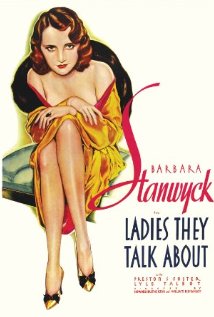
LADIES THEY TALK ABOUT
US, 1933, 69 minutes, Black and white.
Barbara Stanwyck, Preston Foster, Lyle Talbot, Dorothy Burgess, Lillian Roth, Maude Eburne, Ruth Donnelly.
Directed by Howard Bretherton and William Keighley.
Barbara Stanwyck was in the early years of her career when she made this film but was certainly a striking screen presence, full of confidence, full of charm when she wanted, very tough also when she wanted, a beautiful star in the making. And she was to fulfil her potential over many decades, unfortunately never winning an Oscar, despite performances in such films as Double Indemnity.
This is a tough potboiler from 1933, made before the application of the Motion Picture Code and its strictness – in the prison sequences there is a former madame of a brothel who refers to her business in terms of a shop – and also has the last word in saying that Barbara Stanwyck’s character would be most welcome in her shop! There is also a glimpse of a very butch prisoner, in male clothes… While there were to be tough women’s prisons films in the years to come, including Eleanor Parker and Hope Emerson in Caged, 1950, it was not until the 1970s with the sexploitation films that all these sexual elements in prisons came to the fore again.
Barbara Stanwyck portrays Nan, a criminal, brought up in her home town in a deacon’s family but rebelling against it, posing as a wealthy woman and persuading a guard to open a bank, with the result that the bank was robbed. Because she is known to the police, she is charged. In the meantime, David Slade is a moral campaigner, also from Nan’s hometown. He speaks to large audiences on law and order – but, on meeting Nan again, he falls for her and she for him. She tells the truth about her role in the robbery and is charged and sent to prison.
Much of the film is set in the prison, the women being very tough, Dorothy Burgess as Susie, a born-again Christian devoted to David Slade who sets up Nan for further punishment. Of great interest is Linda, a sympathetic prisoner, who also sings, played by singer and actress, Lillian Roth (whose MGM biography, I’ll Cry Tomorrow featured Susan Hayward in the role). David Slade is played by Preston Foster.
1. The title and expectations? A film of 1933? Pre- Motion Picture Code?
2. The ladies, criminals, gangsters’ molls? Featured glamorously in the newspapers with photos and stories? In prison? The range of women in the prison? Black and white?
3. Robbery story, Nan and her glamour, with the gang, persuading the guard to let her into the bank, the robbery, her fainting? Her being charged, recognised by the detective? In prison, expecting to get out?
4. David Slade, his moral campaigns, like religious revival meetings, the applause, especially from women, promise of law and order? His meeting Nan, memories of the past, the different upbringings? His being infatuated with her, the plan with the DA to get her out, part of his campaign? Her telling the truth, his reaction, testifying against her in court, her imprisonment? His writing letters, her ignoring them? Eventually wanting to see him, the plan for the male prisoners and their tunnel, putting the letter in his jacket?
5. The prison, Maggie, her brothel past, the way she talked about her work, dominant, the chair, friendly? Protective? Susie, the antagonism towards Nan, born-again, plotting against Nan? Nan punching her? Linda, friendship, the two of the prison? Her singing? Supporting Nan? The aristocratic prisoner, murder, her treatment of the black prisoner?
6. The guards, severity, freedoms? Noonan and the parrot on her shoulder? Sympathetic towards Nan? Helping her? Nan being framed, the work and the laundry?
7. The contact from Lefty, his visits, the plan, Nan talking with Noonan and the impression of the keys? The plan of the cells?
8. The title, the men being caught? Nan and her anger against David Slade?
9. Getting out, into the rally, Susie as part of the choir, Nan with the gun, confronting David, blaming him about the capture of the criminals and their deaths? Susie at the keyhole? The detective, the shot, David disguising it, the detective knowing the truth, Nan putting the notice on the keyhole?
10. Happy ending – but for how long?
Published in Movie Reviews
Published in
Movie Reviews
Tagged under